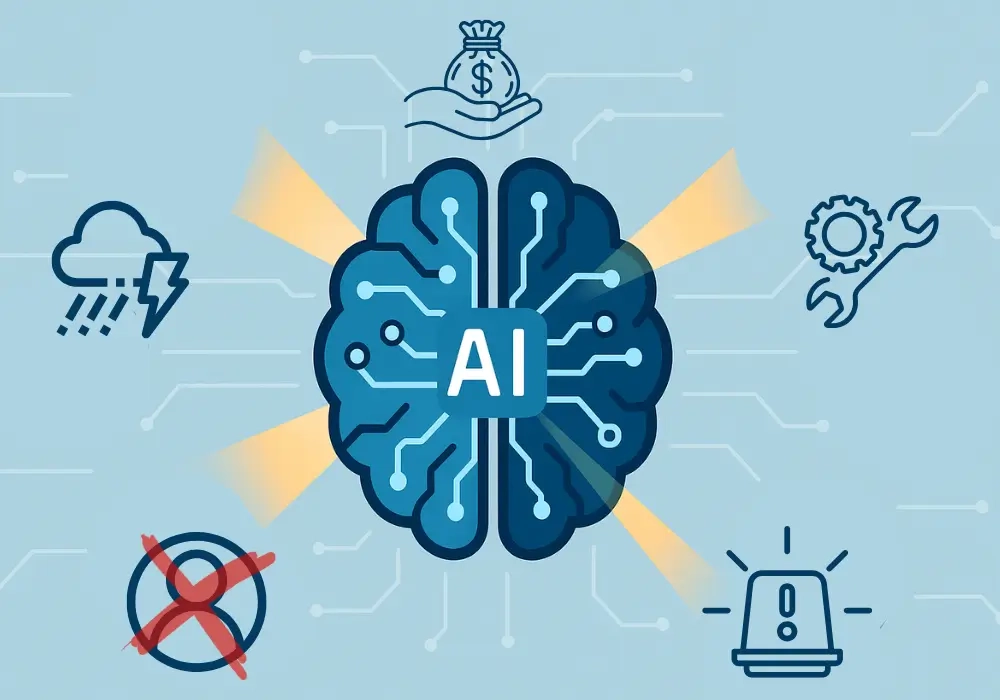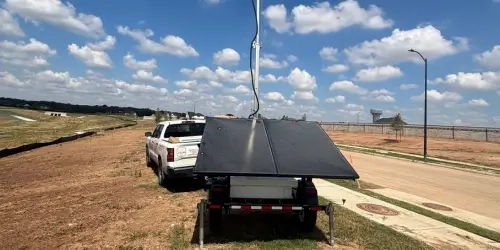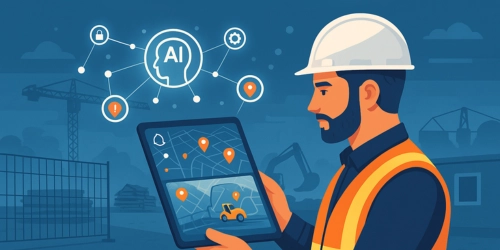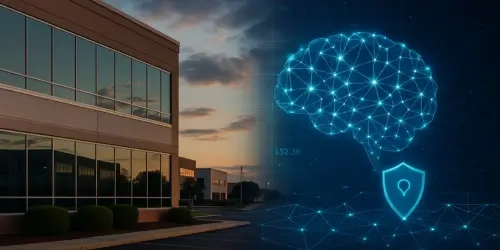Smart security systems have come a long way in recent years, yet many construction teams still question whether or not to adopt them. Why? Some worry the technology is too expensive, while others assume it's difficult to manage or won't hold up in tough environments.
These concerns are understandable, especially for crews that have relied on guards or fixed cameras up to this point.
But most of these beliefs are based on myths, and the reality is, older systems don't reflect how today's smart systems actually work. Modern security solutions are built to be simpler, more reliable, and far more cost-effective than traditional setups.
In this article, we'll debunk the 5 most common myths about smart systems we hear from construction teams and explain what the technology really delivers on active jobsites.
Myth #1: “Smart Systems Are Too Expensive for Most Jobsites”
The belief that smart security comes with a high price tag usually ties back to earlier systems that were costly to install and even harder to maintain.
Today's setups are very different. Solar surveillance trailers and pole cameras deploy without trenching, cabling, or IT expertise and can be fully operational in under 20 minutes (basic setups).
By contrast:
-
Fixed cameras are far more costly to install, with up to 8 hours of labor, specialized skills, and around $600 per unit (before they're even powered).
-
Traditional setups rely on daily grid power, around 10kWh per day.
-
A diesel generator powering a remote surveillance setup can burn through $15,300 a year in fuel, with another $1,000 in maintenance fees.
Mobile surveillance units eliminate all of that. Our Surveillance Trailers, standing up to 20 feet with a near-360° field of view and equipped with HD PTZ (Pan-Tilt-Zoom) cameras, can replace multiple fixed cameras with a single, portable unit.
Even better, they replace overnight guards (often costing roughly $40,000 a month) at a fraction of the cost, reducing your security costs by up to 88% without compromising coverage and reliability.
Read more:
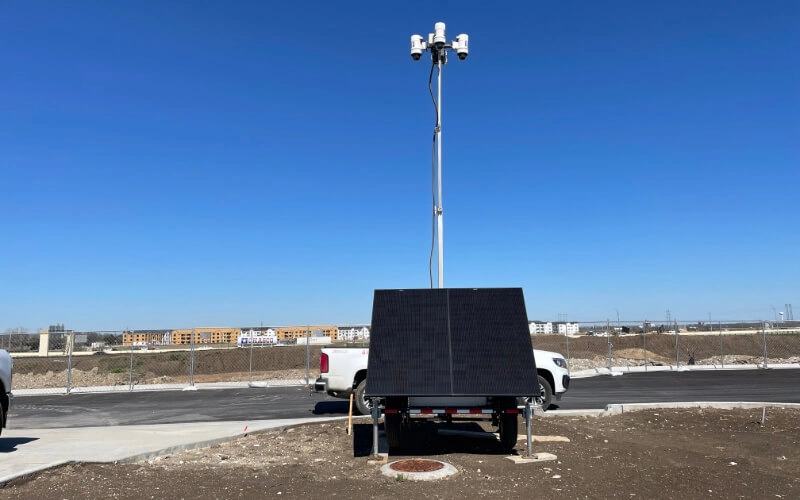
Myth #2: “Smart Devices Are Complicated to Install and Manage”
Many in the construction industry still think of smart security as a complex IT project, when realistically, today's systems are built for rapid deployment and ease of use, making them an effective foundation for modern jobsite security plans.
Here's what a typical plug-and-play setup by our team looks like in action:
-
We start with a quick jobsite assessment to understand the layout, high-risk areas, and power options, then recommend the right mix of security solutions.
-
Our technicians handle the installation, from positioning units and setting detection zones to testing analytics, voice-down audio, and app access.
-
Basic deployments are up and running in minutes, not hours, with no trenching, network cabling, on-site servers, or specialist IT support required.
Once the system is live, ongoing diagnostics take the work off your team:
-
Automated remote checks flag connection issues, recording faults, camera movement, or hard drive errors.
-
Smart switch technology resolves 99% of reboot needs remotely.
-
Live monitoring partners confirm genuine alerts, issue audio challenges, escalate to law enforcement when needed, and send time-stamped reports directly to you.
The last stage of the process is integration. Stellifii, our cloud-based platform, connects all of our surveillance security solutions in one place. No more jumping between tools for video, diagnostics, alerts, or environmental data; with a single login, managers can see everything in a single dashboard from any device.
Myth #3: “Smart Technology Generates False Alarms All Day Long”
Early versions of motion-based security triggered a lot of unnecessary alerts, so it's understandable that some teams still worry about false alarms today. Basic motion sensors often trigger lights or alarms the moment any motion comes into view, whether caused by debris, wildlife, or a gust of wind.
But modern systems are way more sophisticated, with AI-powered systems being able to identify the type of movement, not just the motion itself, with near pinpoint accuracy.
Here's how our Smart Detection Systems improve accuracy on jobsites in real-time:
-
Intruder Detection filters out non-threats like shadows, blowing tarps, machinery reflections, passing animals, or weather changes.
-
PPE Detection verifies compliance (helmets, vests, gloves) without manual inspections.
-
Smoke and Fire Detection analyzes light flicker, smoke movement, or color changes faster than transitional sensors.
Every bit of site activity is analyzed, logged, and documented into Stellifii in real-time. This gives site project managers a clear "birds-eye view" of what's happening, when it's happening, and why it's happening across single or multiple construction projects. From there, teams can adjust detection zones, fine-tune triggers, and/or download reports in just a few clicks, all from the same dashboard.
Myth #4: “Advanced Technology Isn't Reliable in Harsh Weather or Tough Environments”
It's natural for construction managers to question whether smart systems can handle real jobsite conditions, from Texas heat waves to Louisiana storms, dust, lightning, and everything in between. Older technology often struggled in extreme environments, so those concerns are understandable.
Our mobile surveillance units are purpose-built for the realities of US construction. Our Environmental Monitoring Solutions track conditions in real-time where it matters most, such as:
-
Weather monitoring: Monitors temperatures (-4° to 122° F), lightning, wind speed (0–110mph), humidity (10- 99%), dew point, and rainfall (hourly) in real-time. Stellifii automatically flags dangerous conditions and sends instant alerts to site managers, improving jobsite safety.
-
Air quality monitoring: Tracks airborne risks including CO₂, gases, dust, and VOCs with real-time alerts and continuous data logging, ensuring workers' safety and EPA and OSHA compliance.
-
Noise monitoring: Records decibel (dB) levels before, during, and after construction work, alerting managers when thresholds reach (and/or exceed) federal and state limits.
Bad weather doesn't slow down these systems, and the smart software keeps running even in inclement weather. This is because our Solar Surveillance Trailers use:
-
AGM batteries that require zero maintenance
-
Backup batteries that support 10+ days of runtime (competitors last around 3-4 days)
-
High-capacity 750-800W solar panels that maximize charging during low-light winter days
-
Charge controllers that prevent battery damage
-
Remote power management that lets teams monitor usage and set alerts from anywhere
All of these systems connect directly into Stellifii, giving teams one place to see exactly what's happening, from rising temperatures and incoming storms to safety thresholds being reached. This visibility helps managers plan crews, adjust schedules, and respond faster when weather disrupts the day's work.
Read more:
-
Cold Weather, Dark Nights: What This Means For Your Job Site
-
How Our Solar Surveillance Trailers Sustain Security During Winter
Myth #5: “Advanced Analytics Will Replace Tech Savvy People or Compromise Privacy”
This concern comes up often, especially on large building projects that already rely on several different technologies. The idea that advanced analytics could replace people or expose sensitive data can feel unsettling.
In practice, the opposite is true. Smart systems are built to support the people running the job, not replace them. Smart technology automates repetitive tasks that generally slow teams down, such as:
-
Watching for intrusions
-
Logging events
-
Tracking conditions
-
Compiling reports
This is beneficial for site managers as they stay focused on managing crews and keeping projects moving.
Here's how smart systems work:
-
Handles intrusion, PPE, and smoke and fire detection in real-time.
-
AI filters out the noise, verifies genuine footage, and escalates only what matters.
-
Monitoring partners verify alerts, issue audio warnings, and contact law enforcement when needed.
-
Supervisors get clear incident reports, evidence clips, and compliance logs without manual effort.
Privacy isn't something added later on; it's part of the design from day one. Here's how Stellifii keeps data secure:
-
Industry-approved cloud infrastructure
-
AES-256 encryption
-
NDAA-compliant hardware
-
Role-based access
-
Time-stamped audit logs
-
Controlled retention policies
Construction managers stay in control of every setting. They decide who can view footage, which devices can access it, and for how long. In a nutshell, the system does the detecting, while site managers make the final calls.
Read more:
-
How IT Managers Can Support Hybrid and Remote Construction Safety Management
-
Why Smart Surveillance Systems Are the Future of Business Security
Smart System Myths and Facts Debunked: Overview
Here's a quick overview of the most common misconceptions compared to what today's connected systems actually deliver.
| Myth | Reality |
| Smart systems are too expensive for most jobsites. | Solar-powered, redeployable units eliminate installation costs, reduce guard spend, cut power use, and support up to 88% savings across both short-term and long-term projects. |
| Smart systems are complicated to install and manage. | WCCTV handles deployment, setup, and configuration. Diagnostics run automatically, and Stellifii gives teams one dashboard for cameras, alerts, and environmental data. |
| Smart systems trigger too many false alarms. | AI filters routine motion and verifies detections with video clips, alerting teams only to confirmed risks. |
| Smart systems won’t work in harsh weather or extreme conditions. | Environmental sensors, rugged hardware, AGM batteries, and high-capacity solar keep systems running through heat, storms, winter cold, and low-light conditions. |
| Smart systems replace people or compromise privacy. | Technology handles detection, while people handle decisions. Stellifii uses encrypted, access-controlled dashboards with audit logs so supervisors stay fully informed and in control. |
Smarter Systems, Stronger Jobsites
Once you line up the myths against the facts, it's easy to see how much smart technology has advanced. Modern smart systems aren't complicated; they are practical tools built for the day-to-day realities of US construction.
With over 20-years of experience in mobile surveillance solutions, we have supported thousands of construction teams as they navigate evolving jobsite risks. We understand the pressures project managers face, and know how to build a setup that fits the pace of real construction work.
If you're exploring what connected security could look like for your next project, our team can walk you through the options.
